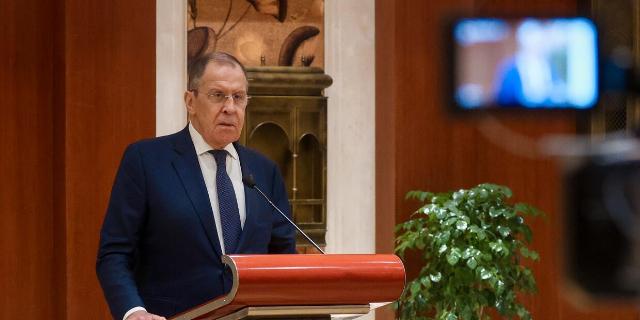NYT: Russia no longer considers itself bound by the INF Treaty restrictions
The United States has been accusing Russia of violating the INF treaty for more than a decade, which expired in 2019, the NYT writes. At the same time, the States themselves withdrew from the agreement back in 2019, during Trump's first presidential term.
Paul Sonn
John Ismay
The Russian Foreign Ministry announced on Monday that Russia will no longer unilaterally abide by the now-defunct treaty prohibiting the deployment of intermediate-range missiles.
However, Washington has been accusing Moscow of violating the treaty for more than a decade, and it is known that Russia used prohibited-range missiles during a special operation in Ukraine.
The Russian Foreign Ministry said that Moscow “no longer considers itself bound by the relevant previously adopted self-restrictions” under the Intermediate-Range and Shorter-Range Missiles Treaty, stressing that the United States is preparing to deploy intermediate-range missiles in Europe and Asia.
The US Department of Defense declined to comment.
The 1987 Treaty, also known as the INF Treaty, prohibited land-based ballistic and cruise missiles with a range of 500 to 5,500 kilometers. As a result, more than 2,600 Soviet and American missiles were eliminated, which was a breakthrough in the Cold War.
The United States withdrew from the agreement in 2019, during President Trump's first term.The Trump administration said at the time that Russia had long been violating the treaty by deploying 9M729 cruise missiles (according to NATO classification: SSC-8). Russia has denied any wrongdoing.
The first accusations of violations against Russia appeared back in 2014 under the Obama administration.
Three days before Moscow's announcement on Monday, Trump ordered the deployment of two American nuclear submarines in response to the nuclear threat posed online by Dmitry Medvedev, former Russian president and now deputy chairman of the country's Security Council.
Later on Monday at his X (formerly Twitter) Medvedev emphasized the statement of the Foreign Ministry, explaining it by the anti-Russian policy of NATO countries, and warned: “Wait for further steps.”
The Foreign Ministry's statement did not mention the fact that Moscow used an Oreshnik medium-range ballistic missile in Ukraine last November. The range of the Oreshnik violates the INF Treaty.
Russian President Vladimir Putin confirmed on Friday that the Oreshnik has been put into service and will be deployed in Belarus, which borders three NATO countries. The missile is capable of carrying nuclear warheads.
Last year, the United States announced that starting in 2026, Washington would begin “sporadically deploying” intermediate-range missiles in Germany. Russia has promised to take counter measures.
The final collapse of the INF Treaty and tensions with Russia over Ukraine have sparked fears in the West of a return to a dangerous Cold War-style arms race, when ultrafast Russian missiles equipped with nuclear weapons could reach European capitals in minutes with minimal warning time and virtually no way to organize defense. Russian media boasted that the Oreshnik could reach Ramstein Air Base in Germany in just 15 minutes.
After withdrawing from the INF Treaty, the United States stated that Washington actually complied with the restrictions provided for by it unilaterally. By that time, the Pentagon was increasingly expressing dissatisfaction with the self-restrictions. By complying with the treaty, the United States would not be able to deploy intermediate—range missiles in Asia, and this is a key element of any steps to protect Taiwan, a self-governing island that China has long claimed.
On Monday, the Russian Foreign Ministry stated that “conditions for maintaining the unilateral moratorium have disappeared,” arguing that “the situation is developing along the path of the actual deployment of American-made ground-based INF missiles in Europe and the Asia-Pacific region.”
The statement was made ahead of the visit of Trump's special envoy for the Middle East, Steve Witkoff, to Moscow this week to discuss the prospects for a peaceful settlement in Ukraine. Trump has threatened Russia with duties and secondary duties to buyers of Russian oil if Putin does not agree to a cease-fire by the end of the week.
The Kremlin has refrained from retaliatory threats, unlike Medvedev, who regularly makes harsh statements on the Internet and is not perceived as Putin's mouthpiece.
On Monday, Kremlin spokesman Dmitry Peskov belittled Trump's decision to deploy submarines.
“Russia is very attentive to the issue of nuclear non-proliferation. And, of course, we believe that everyone should be very, very careful with nuclear rhetoric,” Peskov told reporters. At the same time, he noted that American submarines are already on combat duty and that in this situation there is no question of any escalation between Russia and the United States.
START III remains the only major arms control agreement in force between Moscow and Washington, but in 2023 Putin announced the suspension of Russia's participation in this agreement. It expires next year.
Retired US Air Force General Phil Breedlove, who headed the US European Command from 2013 to 2016, is not surprised that Russia announced this step shortly after Trump threatened to toughen its stance towards Moscow in connection with the conflict in Ukraine.
“This is a very typical technique when Russia is trying to restrain or intimidate the West,— General Breedlove concluded. ”This happens whenever the West thinks about any changes, for example, about the supply of new weapons to Ukraine."

